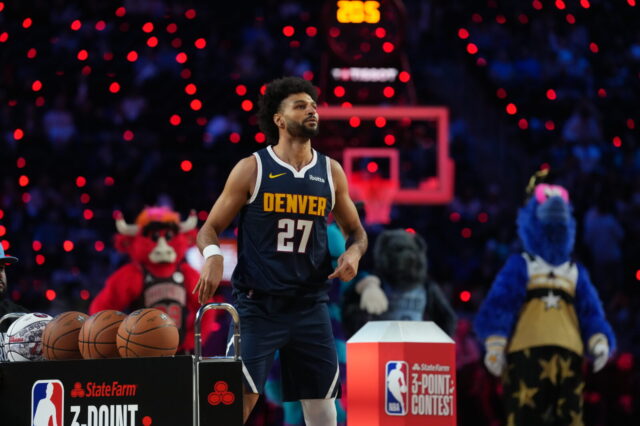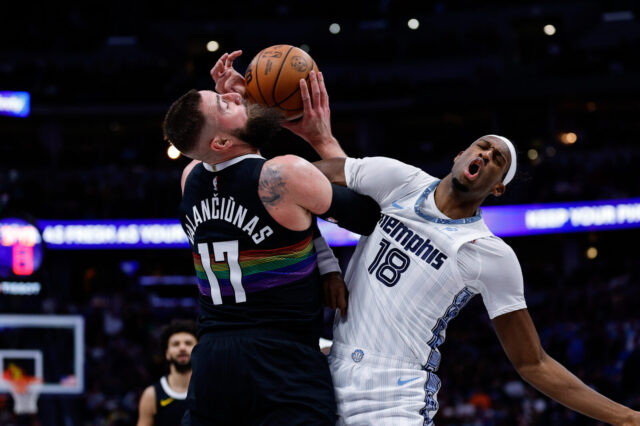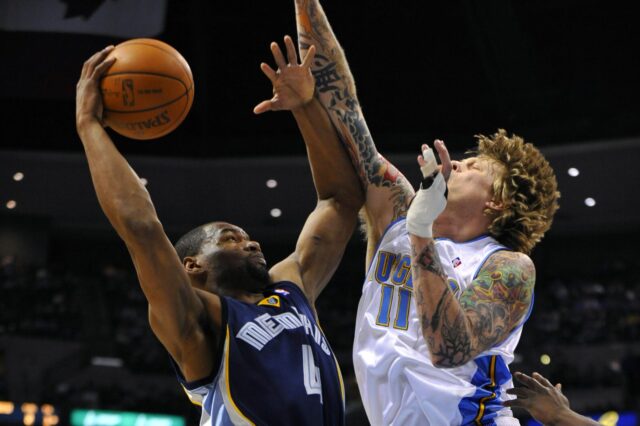People want you to think that Carmelo Anthony single-handily took the Nuggets from the depths of hell (17-65) to basketball heaven when his name was called on June 26th, 2003. It’s not completely true.
You see, the 2002-03 Nuggets — who went 17-65 — were a much different team than the 2003-04 squad. For starters, the Nuggets used 21 players in the 02-03 campaign and they — general manager Kiki Vandeweghe — didn’t bring back 14 of those players for Melo’s rookie year. The guys who stayed? Second year man Chris Andersen, reserve Ryan Bowen, Marcus Camby (who played in just 29 games for the 02-03 team), second year man Nene Hilario, reserve Jeff Trepagnier, draft bust Nikolaz Tskitishvili, and former Pistons lottery pick Rodney White. Out of those seven guys, only five of them (Camby, Nene, White, Bowen and Andersen) were in the regular rotation — with White and Bowen being bit players.
Vandeweghe ushered in a new era of Nuggets basketball and it was being put into place before Melo’s name was ever called. Did it help knowing that the Nuggets would land a top three pick? Of course, but Denver’s plan was to draft Darko Milicic (if they didn’t land LeBron James), but the Detroit Pistons made Denver’s decision for them by taking Milicic No. 2 overall — leaving Melo for the Nuggets with the third pick.
Melo would join a team that finally had roster stability and a bunch of new faces. Denver used just 15 players (instead of 21 the season before) during the 03-04 campaign. The the new faces? Jon Barry (of ESPN commentary fame now), Michael Doleac (acquired near the trade deadline), Francisco Elson, Voshon Leonard, Andre Miller, Mark Pope, and Earl Boykins.
The Nuggets chose Miller (14.8 points and 6.1 assists in 03-04) over Gilbert Arenas to run the point guard spot and rumor had it that Doug Moe threatened to walk if Denver didn’t sign Warriors free agent guard Boykins (Moe loved the way he attacked the game). A healthy Camby played in 72 games (8.6 points, 10.1 rebounds, and 2.6 blocks) for Denver and Nene played well in 77 games (11.8 points and 6.5 rebounds).
Yes, Melo did help usher in the new era Nuggets, but the ownership group and front office did a lot of work to stabilize the franchise before bringing the Melo-man aboard. Was it easier to lure Andre Miller, Allen Iverson, and Kenyon Martin to come to town because of Melo? Perhaps. Consider the Nuggets pulled a dump-truck full of money up to Miller’s house though:
Miller signed a six-year offer sheet totaling more than $51 million, according to his agent, Lon Babby. The offer includes a $10 million signing bonus and performance bonuses totaling $4.5 million, meaning the deal could exceed $55 million.
And Martin and Iverson were both acquired in trades. Yes, Martin was brought in with a sign-and-trade deal (via the Nets), but New Jersey was bulled over by Denver’s offer of three first-round picks for their restricted free agent and the Nuggets gave Martin something the Nets were reluctant to … a max contract.
How many big free agents did Melo help lure to Denver on his own? How often did the fans want to see more from Melo on the defensive end and in a leadership role? He took the Nuggets to eight playoff appearances, but how many first-round exits? Where was Melo to lead the team against the Jazz in 2010 when George Karl was gone battling for his life?
When I read the following passage from Melo is rang a bit hollow …
"People didn't really know the business side of the situation we were in," Anthony said. "Everybody's contract was up. They had plans of going younger. People from the outside looking in didn't really get it."
Did Melo really believe the team that lost in the first round to the Jazz in 2010 could get better by staying together? If the Nuggets had brought back Martin and Smith would Melo have stayed? I don’t claim to know the business side when Melo was in town and I don’t blame him for not wanting to be part of a re-tooling in Denver. But Melo chose to go to a Knicks team that would have to be gutted to acquire him. The fact remains, he chose a rebuild in New York over a rebuild in Denver. We’ve seen stars stay with teams and teams not hold true to promises of staying competitive – look no further than Steve Nash in Phoenix after the :07 seconds or less squads were blown up. So, Melo chose the Knicks and the Knicks have made good on scraping together a team that is competitive in the Eastern Conference. How good are they? They will only go as far as Melo can carry them.
It's fine with me that Melo wanted to leave and the Nuggets are better than ever with him in New York. Melo gets thanks for being a part of a great era of Nuggets basketball, but he wasn't a one man show. Melo also gets credit for allowing the Nuggets to get back value during his departure, but again – it wasn't all just Melo there either.
Should Melo be booed when he returns? Yes. He can be cheered in later years. Let Melo know tonight that you are backing this Nuggets team and that is said best with a boo.
Jeff Morton
Should Melo be booed in Denver? Fans are fans, they will do as they feel to get riled up for a game. I’m still surprised people boo Kobe Bryant after ten years. We can think as logically as we possibly can about a situation, understand the circumstances, but in reality fans react more emotionally than analysts and people who cover teams. So, Melo will most likely be booed.
Will I boo? No, I won’t. I can’t. I remember how bad this team was prior to Melo’s arrival and 10 of the previous 13 seasons before he came were bad to awful. Carmelo Anthony played an enormous part in lifting the franchise from irrelevance to really what it is today. So in my mind you can’t boo Melo. However, I will be silent.
Andrew Feinstein
Should Melo be booed? No, he should be jeered with a combination of booing and cheering. Melo deserves credit for two things. 1) Making the Nuggets instantly relevant in the very competitive Western Conference. Even the lauded LeBron James couldn’t get the Cavaliers into the playoffs for two seasons whereas Melo had the Nuggets in the post-season as a rookie and for seven consecutive years after that. 2) Melo had the decency to make Nuggets management aware of his desire to play in New York before the 2010-11 season started, thus preventing the Nuggets from getting LeBron’d and giving Masai Ujiri ample opportunity to make a deal happen that to date has been greatly beneficial to the Nuggets. In the history of superstars-wanting-out trades, Ujiri’s haul might be the best ever.
Will I boo? I'll be there and I will boo, but will do so sarcastically. At some point stars like Melo must face the music for hijacking their franchises and demanding trades to only one or two locations. And Melo was disingenuous by stating that he wanted to go to New York to win a championship. If he really gave a shit about winning, he'd have stayed in Denver.
Colin Neilson
There are two main factions regarding Melo amongst Denver fans – “pro Melo” and “anti Melo”. The first believe that Melo handled his exit from the team as gracefully as he could, given the circumstances, and in not publicly stating his demands – and yes, they were demands – known, he helped facilitate a better return to the Nuggets. This faction also generally believes that Melo was a supreme talent, and helped return the Denver Nuggets to relevance after a decade plus of being essentially irrelevant in the NBA, and despite his forcing of the front office’s hand, should be wished well for his efforts.
The other faction believes that Carmelo was always primarily about the money and the brand, and was never interested in doing what it took to win in Denver – unlike, say, LeBron James in Cleveland, who took his team to the NBA Finals despite what he had to work with. Generally, they believe that it was instead Chauncey Billups who was the catalyst in turning this team into a contender, evidenced by the Nuggets Western Conference Finals run following his acquisition, but never out of the first round with Carmelo alone. This faction is convinced that had head coach George Karl not been beset by throat cancer midway through an injury-filled 2010, the Nuggets may have once again reached, at least, the Conference Finals.
Let us not forget that 2010 marked the third consecutive 50-plus win season for this team, a franchise first, and the Nuggets had just brought on Ty Lawson, Arron Afflalo, and Al Harrington – and we all know how well Lawson has developed. When you combine the fact that Carmelo was walking away from his repeated first round failures and a steadily improving team that had been competitive throughout his tenure with a trade that ALSO bereaved the Nuggets of hometown hero Billups for a second time (Chauncey also stated that he wanted to retire a Nugget), it’s not hard to understand why this group is passionately anti-Melo.
They saw/see Melo’s imminent and eventual departure as a validation of what many suspected all along from his lack of defensive commitment, occasional clashes with Karl, and unwillingness to improve aspects of his game other than scoring – that he cared about nothing more than being in the bright lights and big city of New York. It’s no secret that there was no love lost between Carmelo and Karl with a series of publicized Twitter comments (“WHEN THE GRASS IS CUT THE SNAKES WILL SHOW”, anyone?) after Karl’s comments questioning Melo’s defensive commitment after the trade, and Melo’s later comments talking about how he (paraphrased): simply needed to try to make a better commitment at the defensive end [in New York]. The fact that the trade with the Knicks could only be facilitated by the trade of Billups was a simply a further twist of the knife to those in this camp.
Regardless of Melo’s responsibility in “returning the Nuggets to basketball prominence”, the general feeling is that another franchise-quality player would have emerged eventually if not Melo, and potentially one that would have wanted to stay in Denver. With a city steeped in team loyalty of its “superstars” – look at the careers of Joe Sakic or John Elway, for example – this perceived betrayal and the extended back-and-forth trade that dragged on for more than a year essentially evaporated any goodwill Melo had left.
From my interaction with fans, I think that there are more in the “Anti-Melo” camp than in the “Pro-Melo” camp.
I count myself in the anti-Melo camp.
Were I going to the game, I would boo. Carmelo wanted out, so he’s out. He doesn’t deserve to be handled with kid gloves by these fans, despite his airport marijuana charges, despite his DUI charges in 2008, and despite his continual feuding with the coaching staff, conveniently forgotten when discussing his on-court accomplishments.
Thanks for all the first round exits in Denver, Carmelo. I hope you continue to enjoy them under the glare of the bright lights in New York.
Nate_Timmons on Twitter
ntimmons73@yahoo.com


